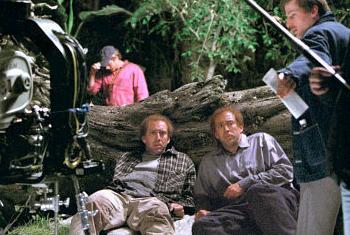Year: 2002
Director: Spike Jonze
Writer: Charlie and Donald Kaufman
“I don’t have an original thought in my head. I am old. I am fat. I am bald. I am repulsive. I have never lived. I blame myself. I –“
Thus begins our descent into the neurotic psyche of Charlie Kaufman, a Hollywood screenwriter who’s adapting Susan Orlean‘s “The Orchid Thief” and ends up writing himself into it. Deconstructive and self-referential enough for you yet? Also mixed into “Adaptation” are Kaufman’s fictional twin brother (and credited co-writer!) Donald, Orlean and John Laroche, the orchid poacher the non-fiction book being adapted in “Adaptation” revolves around. Kaufman’s script is insanely original, maybe even more than his Being John Malkovich. Like that film, “Adaptation” blends thought-provoking philosophy (linking Darwin’s theories about flowers to the way us human folks must adapt to function in life), laugh-out-loud hilarious comedy and sincere human drama, with a whole other layer of postmodernism on top, as it’s a screenplay about the process of its own writing. And it’s about flowers.
It’s really something how you think and feel all these different things, sometimes through the same scene, sometimes even simultaneously! Take Kaufman’s obsession with every other woman he meets, how he desperately yearns for them for no logical reason. It’s pathetic and I laughed, but maybe instead of crying. Because I think in the end most men know about the acute pain of encountering beauty in fast-food places, stores, on the street, on a ferry (re: the old man’s story about the girl in the white dress in Citizen Kane?), and knowing it’ll never be yours. The movie is about that, about passion, nature, writing… It zigs when you think it’s gonna zag, it’s smart when you thought it’d turn silly, and vice versa…
Where the script suffers a little, I feel, is in its translation to the screen. Spike Jonze possesses some sort of demented genius fitting in nicely with Kaufman’s out-there ideas, but to a degree he doesn’t have that assured a directorial hand. Through most of “Adaptation” this is hardly distracting, as the writing is evocative enough to withstand occasionally clumsy visuals, but the third act of the movie is supposed to “wow” the audience, and it’s a bit of a letdown when it doesn’t. I love the concept of the switch in tone involved there (even though it’s derivative of the Bruce Willis/Julia Roberts scene in The Player), but Jonze doesn’t do it justice. The climax should have been awesome! cool! thrilling! emotionally overblown!, Jerry Bruckheimer-style, but it’s limp, dark, badly shot. Another gripe I have is, and I know this is unfair, that “Adaptation” works better on paper– by its very nature, this screenplay about a screenplay is most effective AS a screenplay. For instance, it’s nifty and amusing how Charlie Kaufman himself acknowledges his script’s flaws (like how he’s unable to make us feel how fascinating flowers are, or how self-indulgent the use of voice-over can be), but when you’re watching the actual movie these are still flaws, right?
Still, here I am bitching and bitching as if I didn’t like “Adaptation”. I do! It’s just disappointing when a film comes close to greatness but falls short. That doesn’t mean we can’t be grateful for the many things that do work in it, most notably how interesting and engaging all the characters are, thanks in no small part to uniformly solid performances from the cast, from Chris Cooper and Meryl Streep as Laroche and Orlean to even the smallest parts. And then there’s Nicolas Cage, delivering two of the best performances of his career as Charlie and Donald. He totally disappears into the roles, and it’s not just the thinning reddish afro and added weight. He has become this insecure, self-loathing writer and his brother who, despite sharing the same shortcomings, adapted to use them to his advantage. We also forget about the inevitable use of trick photography, so seamless Cage’s acting with himself is. Nicolas Cage and Nicolas Cage have great chemistry together! So “Adaptation” has got great acting and great writing, but the direction is not-so-great. I can’t really complain! As Meatloaf would say, two out of three ain’t bad.

